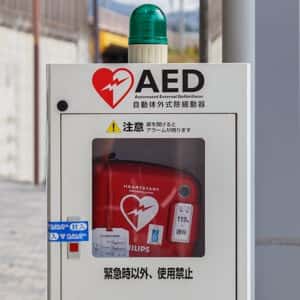
You may have noticed defibrillator stations in airports, sports arenas and other public places and wondered if bystanders using defibrillators can really make a difference when someone has a heart attack. New research shows that the answer is definitively yes.
Investigators in Japan tracked heart attacks and survival. They evaluated chest compression or defibrillation employed by non-professionals while waiting for an ambulance to arrive.
Roughly 168,000 people suffered out-of-hospital cardiac arrest between January 2005 and December 2012. Almost 47,000 of them had bystanders using defibrillators on them before arriving at the hospital and nearly 79,000 were given chest compression by a bystander.
Benefits Were Clear
The results were encouraging. More than 8 percent of those who got chest compression survived without brain damage, compared to only 4 percent of those without the intervention.
Big Gains from Bystanders Using Defibrillators
People lucky enough to have someone use a public access automated external defibrillator right on the spot were especially fortunate: 40 percent of them survived well. This suggests that ordinary citizens who know what to do in this type of crisis can make a real difference in heart attack survival.
Another study reported in the same issue of the Journal found that a state-wide education program in North Carolina was successful at improving the proportion of people who received CPR (cardio-pulmonary resuscitation, AKA chest compression) or had bystanders using defibrillators on them. Those who got such immediate attention from bystanders using defibrillators were more likely to survive heart attacks without brain damage (33.6 percent) compared to people who were treated only by first responders (15.2 percent) en route to the hospital.

